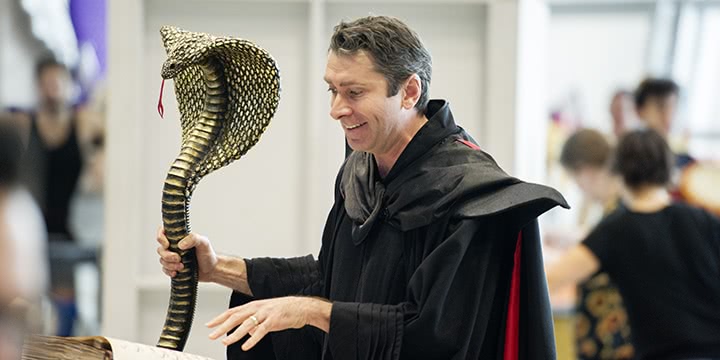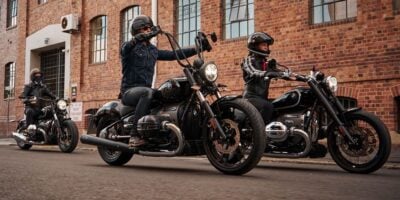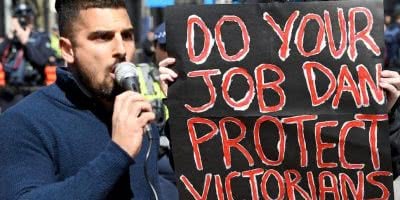Astory as ancient and timeless asAladdincarries a strange sense of simulacra as it comes to the Sydney stage.
This mammoth production, itself an adaptation of Disney’s latest Broadway musical, finds its roots in both the animated film that enchanted a generation and the mythos of One Thousand And One Nights.
Naturally, finding one’s own voice within such a wealth of tradition and history is a daunting task, but especially when it requires making a character as iconic as the villainous vizier Jafar your own. It’s a role that Aussie performer Adam Murphy has taken to with delight.
“It was the laugh in the film – and me trying to find my [own] evil laugh – where the voice started coming,” he says. “It was actually a prerequisite in the breakdown of the character: ‘Must be able to have impressive evil laugh’.”
As with many elements of the production, Murphy’s scheming sorcerer takes cues from Jonathan Freeman’s vocal performance in the film without being beholden to imitation.
“Jonathan Freeman had all those levels of darkness, and the feigning to the sultan, his public face and his lair face – you know, his actual persona,” Murphy says. “You can hear that in [my] voice, and it’s not a copycat but it’s in the same land. If it was on a musical scale, it’s in the same few notes. So that was the starting point, and I also found that looking at the animated film, [I was] working out how I could do that physically – he’s so lean and angular, so that gives you ideas, but you can’t exactly copy that.”
Like Julie Taymor’s staging of The Lion King before it, the musical Aladdin is no mere duplicate. Under the direction of Broadway legend Casey Nicholaw (best known for co-directing The Book Of Mormon), it’s become an iridescent spectacle loaded with intricate choreography, and the primary cast members have been given considerable freedom.
“It’s not a cookie cutter sort of production where we’re doing exactly the same thing as Broadway,” says Murphy. “We’re being given the chance to inject our own personality and ideas into it as well, so it’s been a really great experience. I met [Nicholaw] in the audition process very briefly, and it was a little daunting. He knows what he wants straight away, so almost as you walk in the door, you’ve either got the job or you haven’t. Or it’s yours to lose.”
Murphy is of course humbled and honoured to have received the role, and jokes that Nicholaw may have cast him simply because he was “the tallest guy there”. “I’m six-foot-one, and with the heels in the shoes and the hat that I’m wearing, I’m gonna be like six-foot-six or something. And the staff is taller than me! So it’s very impressive and a little bit scary to move in. And with flowing capes and menacing, maniacal laughter and all that sort of thing, it’s a fun character to play.”
The height element does make it tricky for Murphy’s primary stage partner, his nefarious sidekick Iago, portrayed by Aljin Abella – who, contrary to the film’s representation, is human. “I’ll tell him to stop parroting – ‘Why must you parrot everything I say? Stop squawking!’ – so there’s references … the relationship is the same, the character is the same, it’s just not a parrot,” Murphy says.
“There’s not much they don’t do together, you know – they’re a duo. They’re a partnership. There’s obviously the hierarchy … and that’s where a lot of the comedy comes from – the way Jafar treats Iago, but without Iago, Jafar wouldn’t get to where he is because he goes nuts. And Iago’s the one who’ll just pop over his shoulder and place a little nugget of information in his ear.”
As for Aladdin’s sidekick Abu, he’s been transformed into three human friends – Kazim, Babkak and Omar. Murphy explains that the choice keeps the production uniform and distinct. “If [Abu] was a monkey, then you’re trying to create exactly the film, and this isn’t what this show is,” he says. “There’s new songs especially for the stage show. I think there’s old songs that weren’t used for the film that have been put back in and used, and it just gives it more of a musical theatre experience than a pantomime.”
It’s a reminder that this version of Aladdin is designed for a broad audience, not just for kids. Part of the appeal is the elaborate stagecraft – including a legitimate flying carpet – and even primary actors like Murphy aren’t privy to the tricks. “There’s a few magical elements that I’ve not rehearsed in properly yet, and I’m really looking forward to it,” he says. “Apparently it’s knock-your-socks-off stuff.”
Murphy may be crafting his own take on the villain, but he already has two fans parroting his efforts: his two daughters, both Disney fanatics who’ve been more than willing to help their dad rehearse. “They’re more excited about Frozen: The Musical,” he laughs, nodding to Disney’s next major Broadway development. “But yeah, they’ve been very excited about Dad being a villain. They tell their teachers I’m Jafar and none of them believe it.”
It seems Murphy has made his own Faustian pact: sure, his daughters may have stopped singing ‘Let It Go’, but now they’re becoming their own little villains. “They’re both really good at the laugh,” he says, with more than a hint of mischievous pride. “That was a surprise.”
[Main image:Aladdin – Adam Murphy in rehearsals Photo by Rupert Kaldor]
Aladdin startsWednesday August 3 at the Capitol Theatre.


































